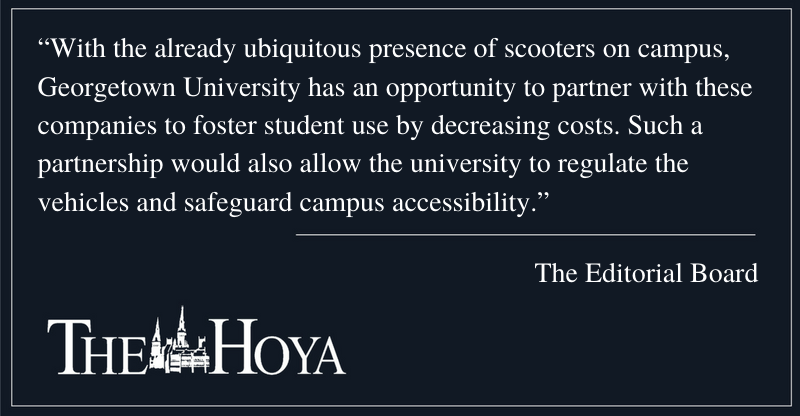Georgetown University’s inaccessibility to the rest of the nation’s capital is no secret: With subpar public transportation, limited schedules of Georgetown University Transportation Shuttle buses and the expense of ride-sharing services, students have trouble exploring Washington, D.C.
To increase accessible transportation options and alleviate cost, Georgetown should partner with scooter companies to provide subsidized use of their services. The Georgetown University Student Association has already begun such an initiative by exploring a partnership with Lyft, according to GUSA President Norman Francis Jr. (COL ’20). The university should begin by supporting the program.
Scooters have recently become an increasingly popular transportation option in D.C. and Georgetown. The vehicles are abundant around campus and cheaper than ride-sharing services, making them ideal for helping students get to internships, museums and other sites around the city. Scooters can also help students who live off campus commute more easily to class.
Though Lyft scooters cost $1 to activate and 24 cents per minute, costs can add up and be cost-prohibitive for some students. By partnering with Lyft to provide a student discount, Georgetown can help more students benefit from the convenience of scooter services.
Georgetown even implemented a similar program for dockless bikes in March 2018. The university collaborated with LimeBike, a dockless bike service, to provide a 50% discount for students using the service. The program’s implementation created a more affordable, sustainable and healthy mobility option, according to Georgetown’s former Sustainability Metrics and Project Manager Greg Miller.
The editorial board supports Georgetown’s initial effort. But because LimeBike no longer offers bike sharing services in D.C., the university should explore a scooter collaboration to continue offering the same benefits to students. Since students have already demonstrated an affinity for using scooters because of its convenience and lower costs, such a program has more potential for success.
By collaborating with scooter companies, Georgetown can also alleviate accessibility concerns posed by unregulated scooter parking. While scooters are prohibited from parking in a way that impedes access to public and private property, these rules are often violated.
Inappropriate parking pose physical accessibility concerns for people with disabilities, according to Anna Landre (SFS ’21), Georgetown Disability Alliance co-founder and wheelchair user.
“Oftentimes, scooters are left in locations that block pedestrian right-of-way and constitute a barrier for disabled people,” Landre wrote in an email to The Hoya. “Personally, I’ve had the path in front of my apartment blocked by scooters on several occasions, preventing me from getting home.”
A university partnership with Lyft would allow Georgetown to solve the unregulated parking by establishing distinct parking zones, according to Francis.
“We believe this partnership with Lyft could be a potential solution on finding zones to place them,” Francis wrote in a message to The Hoya. “We are also exploring partnerships with other scooter providers as well to find an all-encompassing solution.”
The university should also further engage in conversations with other scooter companies to determine the best parking spaces on campus and ensure improper parking does not encroach on physically accessible routes on campus.
With the already ubiquitous presence of scooters on campus, Georgetown has an opportunity to partner with these companies to foster student use by decreasing costs. Such a partnership would also allow the university to regulate the vehicles and safeguard campus accessibility. The university should embrace the opportunity, partner with GUSA on its current Lyft initiative and investigate further partnerships with other scooter companies that operate on campus.
Scooters are here to stay, and Georgetown can help more students access the convenience of scooters while alleviating physical accessibility concerns.
The Hoya’s editorial board is composed of six students and chaired by the opinion editor. Editorials reflect only the beliefs of a majority of the board and are not representative of The Hoya or any individual member of the board.















Brett Young • Nov 15, 2019 at 10:58 am
I have been working on a multi-use trail from the Palisades connecting to Prospect ST and 27th. I think this would give students, faculty and employees of the hospital greater access to the university if this trail was implemented.
Current Georgetown University told me that this connect would be unsafe, even though we would be connecting the path to prospect where, on GU’s own campus maps, it says anyone is permitted to ride a bicycle.
Feel free to contact me about this:
Here is the email I received from GU’s communication office:
——————————————
Ruth McBain
Manager of Media Relations
Office of Strategic Communications
Georgetown’s interest in the potential project is limited to the options DDOT has presented for the area east of the Foundry Trestle Bridge – in particular, any options that would cut across or impact our campus and the community we share with our neighbors and put the safety of our student and neighborhood community at risk. We continue to have concerns about how some of these options would impact the University and West Georgetown community. Georgetown is committed to supporting bicycle use as a sustainable and healthy option for our entire community and is pleased to partner with Capital Bikeshare and support bike use in many ways.
We have asked DDOT to consider options that connect the Trolley Trail to the Capital Crescent Trail farther upriver or that connect the Foundry Trestle Bridge to the Capital Crescent Trail via the existing tunnel under Canal Road – an option that would allow for the preservation of the Foundry Trestle Bridge, increase bike access to Georgetown, and connect to existing bike path infrastructure.
————————————
Here is a link to DDOT’s current feasibility Study
https://ddot.dc.gov/node/1383466
Here is a link to an article I wrote for GGW about the trail
https://ggwash.org/view/71177/this-former-trolley-line-is-close-to-becoming-a-walking-and-biking-trail-from-the-palisades-to-georgetown
And here is a map of the trail:
https://www.google.com/maps/d/u/0/viewer?mid=1-wkVj1sUiuBKxNLGLHS4ACRT-wM&ll=38.9170279761834%2C-77.08916010572204&z=13